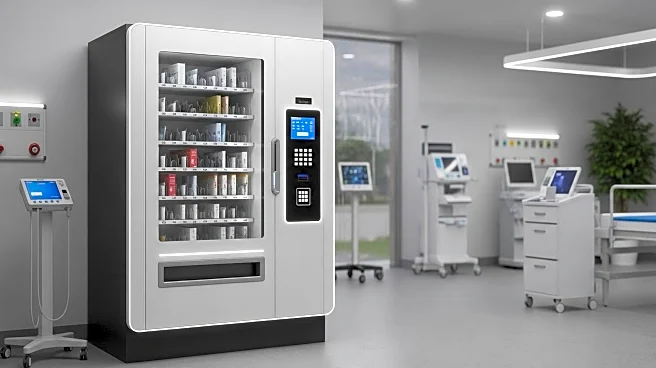What's Happening?
Amazon is set to launch electronic kiosks at One Medical sites, designed to dispense common medications directly to patients. Starting in Los Angeles this December, these vending machines will offer a range of drugs, including antibiotics, asthma inhalers, and high blood pressure therapies. The rollout is part of Amazon's broader strategy to integrate healthcare services, following its acquisition of One Medical in 2022. The kiosks aim to provide immediate access to medications post-appointment, reducing the risk of prescriptions going unfilled. Patients can opt to have prescriptions sent to Amazon Pharmacy for quick kiosk pickup, with medications typically ready within minutes. This initiative addresses the issue of 'pharmacy deserts' in the U.S., where a significant portion of neighborhoods lack convenient pharmacy access.
Why It's Important?
The introduction of drug vending machines by Amazon represents a significant shift in the healthcare delivery model, potentially improving medication adherence and access. By providing immediate access to prescriptions, Amazon aims to tackle the problem of unfilled prescriptions, which affects nearly a third of all prescriptions in the U.S. This move could disrupt traditional pharmacy models and challenge established telehealth providers like Teladoc and Amwell. The initiative also addresses healthcare disparities, particularly in areas with limited pharmacy access, potentially reducing preventable healthcare costs and improving health outcomes.
What's Next?
Amazon plans a wider rollout of the vending machine network in 2026, which could further integrate its healthcare services and expand its market presence. The initiative may prompt responses from traditional pharmacies and telehealth providers, who might need to innovate to maintain competitiveness. Additionally, Amazon's approach could influence healthcare policy discussions around access and delivery models, potentially leading to regulatory considerations regarding automated dispensing systems.
Beyond the Headlines
Amazon's venture into healthcare through vending machines raises questions about data privacy and security, given the sensitive nature of health information. The integration of digital health services with physical dispensing points could set a precedent for future healthcare innovations, emphasizing convenience and accessibility. This development might also spark debates on the ethical implications of corporate involvement in healthcare, particularly concerning patient data management and the potential monopolization of healthcare services.










